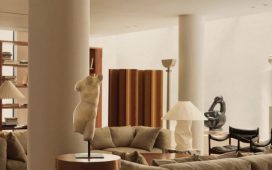[ad_1]
Wayne McGregor is delighted about his new job. He has just been announced as the latest director of dance for the Venice Biennale. “What an invite, right?” he says with a laugh, speaking to me by phone from his retreat on the Kenyan island of Lamu. The dance strand of the arts festival may be less well known than its art and architecture elements – a fact McGregor hopes to change – but it’s still a significant 10-day event, held annually (despite the title). McGregor will be in charge for four years, starting in 2021.
It’s surprising that McGregor, 50, has time for another job. The resident choreographer at the Royal Ballet also runs his own company and studio, and choreographs worldwide (a major production for Dutch National Opera was postponed due to Covid). He has a sideline in movement direction for film (Harry Potter, The Legend of Tarzan), works with Trinity Laban conservatoire in London and Elmhurst Ballet School in Birmingham – and in Lamu, he’s currently writing a book about physical intelligence.
But McGregor is full of energy and revelling in the Venice brief. “It’s a blank canvas,” he says. “We can really invent what we want to do.” And what he wants to do is “work in a way the Biennale hasn’t before”. McGregor wants to deliver an experience that’s not Eurocentric. “Contemporary dance in the African continent has not been widely shared,” he says, “and a lot of South America as well.”

As an early adopter of new technologies in dance, it’s likely virtual and augmented reality will feature, but at a time when many of us have digital fatigue, more than anything he calls the biennale “an amazing opportunity to do some high-touch experiences that we’ve been deprived of”. By which he means dancers in “full-body contact, people moving phenomenally through space, the joy of the physical body moving, unrestricted”.
McGregor spent two weeks in Venice at this year’s dance biennale, curated by choreographer Marie Chouinard, which went ahead last month just before Italy closed its theatres. It was a relief, he says, to be back in a darkened auditorium. “I’ve missed sitting in a theatre next to somebody else, feeling the breathing of the audience, not knowing what’s going to happen when the curtain goes up,” says McGregor. “Will the performers deliver? Will they connect with us emotionally? What will that live moment be? That’s the extraordinary thing you don’t get in a mediated environment on a small computer screen.”
It is not a sensation confined to theatregoing: anyone isolated from others will know the feeling. “It’s a similar kind of bereavement in terms of physical relations,” says McGregor. “The classic idea that you don’t think about your body until something goes wrong with it. This absence of physical relationships has been so marked. The way you communicate when you sense someone next to you, beyond their words, you can’t really get on Zoom. You don’t get the energy transfer that you do from a normal conversation.” Although it has to be said, with McGregor you do get a dose of his enthusiastic, restlessly inquiring energy even over the phone.
The effects of lockdown may bring a new physical awareness. “We’ll all hopefully have improved our physical intelligence through this experience,” says McGregor. “We should have a better spatial sense, certainly, from understanding what that one or two-metre rule is.” And then there’s communicating through barriers, like masks. “I’ve found myself trying to think of other physical ways I can give the sense of what my face would normally do, so I find myself really overanimated in the body, trying to transcend the mask.” I’m pretty sure he’s gesticulating down the phone.
Even lockdown couldn’t make McGregor stand still. As some projects stalled, new ones emerged, but the financial stability of his company was the prime concern. “Yeah, that’s horrendous,” he says. The company earns 70% of its money from international touring, which all stopped overnight. He’s hoping to be back touring by next summer, and he’s planning the biennale for July 2021 “as if it’s going to go ahead all bells and whistles”.
But until then there’s the need to keep the industry alive, especially freelancers who haven’t been eligible for grants. “What I’m seeing is a lot of artists who’ve got literally no money and are looking for any kind of job now to survive. We don’t want that creative asset to be lost.”
McGregor’s company has run training and mentoring for freelance dancers, all Covid-safe: it even has a special antimicrobial dance floor that kills viruses. Ever the optimist, McGregor can somehow find positives in a pandemic. “One of the brilliant things about this whole time is that the freelance community has got together to speak with a more communal voice, which might help us find a fresher future for freelancing. The important message is that the lobbying has to carry on. The £1.5bn for the arts is brilliant and we’re very grateful for it, but there’s still a long way to go.”
[ad_2]
READ SOURCE


